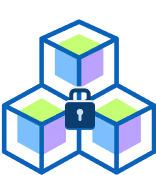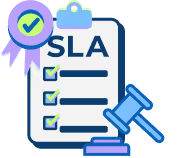Seal Security raises $13M series A to secure open source code at scale. Read full press release.

.avif)
Apply security patches directly to the existing library versions your team is using.

.avif)
Allow your team to address vulnerabilities without altering their development roadmap.
.avif)
.avif)
Enable upgrades to be planned and executed at your team's convenience.


.avif)

Strengthen your supply chain with patches for both direct and transitive dependencies.



Secure your existing images without upgrading—even if you're running older distributions.



Receive security patches post-EOL for platforms like CentOS and RHEL 6, and continue to meet compliance standards.



Streamline the process of fixing security issues in old or legacy code. Address vulnerabilities in difficult-to-patch applications—even those outside your control.

.avif)

Maintain vulnerability-free images to ensure you meet your customers' SLA requirements and successfully pass any security audit, including FedRAMP, PCI DSS 4.0, and NYDFS 500.

.avif)
.avif)

In this webinar, we'll explore how security teams can leverage backporting of security fixes to bypass challenging upgrades and avoid breaking changes.

.png)
Seal Security, a leading provider of application security solutions specializing in automatic curation of vulnerability-free open source components, today announced it has raised $13 million in Series A funding.


In this eBook, we outline how FedRAMP sets clear guidelines to ensure all software components—including open source libraries, application dependencies, container images, and OS components—are kept secure. This ebook will help you stay ahead of audits, slash your vulnerability backlog, and simplify monthly reporting. Download the ebook to see how Seal Security helps cloud providers meet FedRAMP compliance—securely, efficiently, and continuously.

Discover how Seal Security identifies and patches open source vulnerabilities
without breaking changes.
Seal Security delivers one-click, backported, compatible patches for existing versions of open source packages. Seal identifies and fixes vulnerabilities across Linux OS, base images, and application dependencies, including EOL and legacy systems. Seal’s approach reduces technical debt, prevents risk downtime, and helps teams ship faster — without breaking changes or compromising security and compliance posture.
Seal Security handles all critical and high rated vulnerabilities within 72 hours of being made public.
Seal Security helps organizations prepare for upcoming audits for FedRAMP, FIPS, STIGS, PCI-DSS 4.0, and DORA
Seal Security supports all major languages including Java, Python, JavaScript, C/C++, Go, PHP, C#, and Ruby
Seal Security integrates with popular DevOps and DevSecOps tools.
DevOps tools include GitHub, GitLab, Azure DevOps, JFrog, and Docker. Software composition analysis (SCA) tools include Snyk and Black Duck. Other security tools include GitHub Advanced Security, Stack Rox, and Trivy
Seal Security supports all major Linux distributions, including Red Hat Enterprise Linux (RHEL), CentOS, Alpine Linux, Debian, and Oracle Linux
Seal Security is certified with SOC 2 Type II and ISO 27001